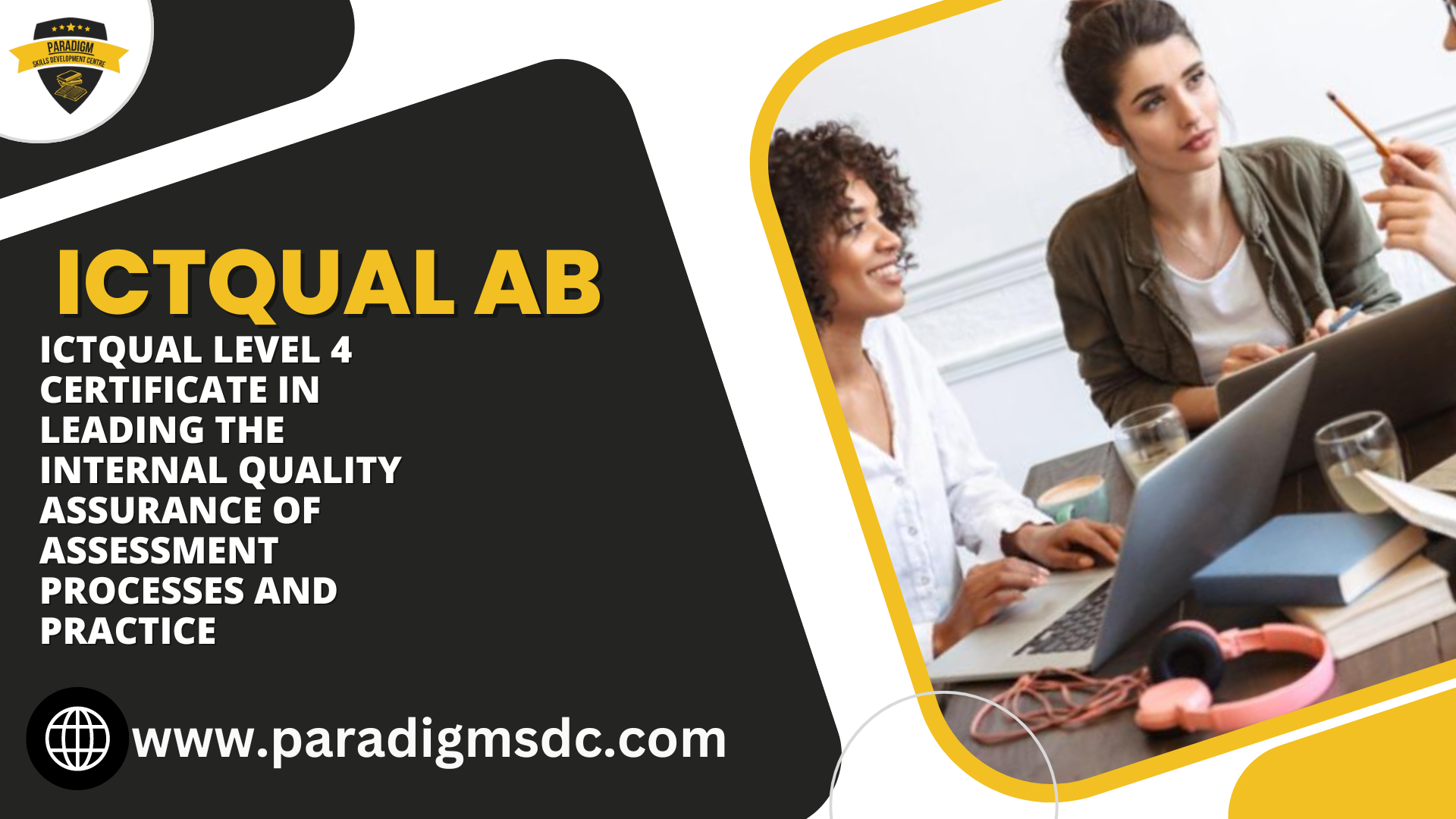Course Introduction
The ICTQual Level 4 Certificate in Leading the Internal Quality Assurance of Assessment Processes and Practice is designed for professionals who are responsible for leading and managing internal quality assurance (IQA) processes within their organizations. This qualification is ideal for those who want to enhance their leadership skills in IQA, ensuring that assessment processes are conducted to the highest standards of quality, consistency, and fairness. The course provides a comprehensive understanding of the principles and practices of IQA and equips participants with the skills necessary to lead and improve assessment quality assurance systems.
Course Overview
The ICTQual Level 4 Certificate in Leading the Internal Quality Assurance of Assessment Processes and Practice offers an in-depth exploration of the roles and responsibilities of an IQA leader. The course combines theoretical knowledge with practical application, ensuring that participants can effectively lead IQA activities and support assessors in their professional development. The curriculum covers various aspects of planning, monitoring, and evaluating assessment processes, as well as providing constructive feedback and fostering continuous improvement.
Course Study Units
- Understanding the Principles and Practices of Assessment
- Leading Internal Quality Assurance Processes
- Managing Assessment Information
- Regulatory Requirements and Compliance
- Leading Quality Improvement Initiatives
- Professional Development and Reflective Practice
- Assessment of Learners
- Managing Assessment Risks and Challenges
- Communication and Stakeholder Engagement
- Project Management and Evaluation
Learning Outcomes
By the end of this course, participants will be able to:
Learning Outcomes for the Study Units:
Understanding the Principles and Practices of Assessment
- Demonstrate a comprehensive understanding of various assessment methods and their applications.
- Evaluate assessment criteria, ensuring they are valid, reliable, and fair.
- Apply principles of assessment to design and implement effective assessment strategies.
- Critically analyze assessment results to inform learning and improvement.
Leading Internal Quality Assurance Processes
- Plan, coordinate, and oversee internal quality assurance processes effectively.
- Monitor assessment practices to ensure compliance with regulatory requirements and organizational standards.
- Identify areas for improvement in assessment processes and implement strategies for enhancement.
- Provide leadership and support to assessment teams to maintain high standards of quality assurance.
Managing Assessment Information
- Understand principles of data protection and confidentiality in managing assessment information.
- Implement secure systems for storing, retrieving, and sharing assessment data.
- Ensure ethical handling of assessment information, maintaining confidentiality and integrity.
- Utilize assessment data to inform decision-making and enhance assessment practices.
Regulatory Requirements and Compliance
- Identify relevant legislation, regulations, and standards governing assessment processes.
- Ensure compliance with regulatory requirements and organizational policies.
- Implement quality assurance procedures to meet regulatory standards.
- Maintain documentation and records to demonstrate compliance with regulatory requirements.
Leading Quality Improvement Initiatives
- Identify areas for improvement in assessment processes through analysis and evaluation.
- Develop and implement strategies to enhance the quality and effectiveness of assessment practices.
- Engage stakeholders in quality improvement initiatives, fostering a culture of continuous improvement.
- Evaluate the impact of quality improvement initiatives on assessment outcomes and learner performance.
Professional Development and Reflective Practice
- Engage in reflective practice to evaluate personal strengths, weaknesses, and areas for development.
- Participate in ongoing professional development activities to enhance knowledge and skills.
- Set goals for professional growth and development, aligned with organizational objectives.
- Apply learning from reflective practice and professional development to improve leadership effectiveness.
Assessment of Learners
- Design assessment instruments and tools aligned with learning objectives and outcomes.
- Administer assessments effectively, ensuring reliability, validity, and fairness.
- Provide constructive feedback to learners to support their learning and development.
- Analyze assessment results to evaluate learner performance and inform instructional planning.
Managing Assessment Risks and Challenges
- Identify potential risks and challenges associated with assessment processes.
- Develop risk management strategies to mitigate and address assessment risks effectively.
- Monitor assessment processes to identify and address emerging challenges.
- Implement contingency plans to manage unexpected issues or disruptions in assessment.
Communication and Stakeholder Engagement
- Communicate effectively with stakeholders to convey assessment requirements, expectations, and outcomes.
- Engage stakeholders in the assessment process, soliciting feedback and input to inform decision-making.
- Build positive relationships with stakeholders to support collaboration and partnership in assessment.
- Address concerns or conflicts with stakeholders diplomatically and proactively.
Project Management and Evaluation
- Plan and organize assessment projects, establishing clear objectives, timelines, and deliverables.
- Coordinate resources effectively to ensure the successful implementation of assessment projects.
- Monitor and evaluate the progress of assessment projects against established criteria and standards.
- Conduct post-project evaluations to assess the effectiveness and impact of assessment initiatives, identifying lessons learned and areas for improvement.
Course Benefits
- Enhanced Leadership Skills: Develop the knowledge and skills required to lead and manage IQA processes.
- Career Advancement: Improve employability and career progression opportunities in education and vocational training.
- Professional Recognition: Achieve a recognized qualification that validates your expertise in leading IQA.
- Effective Feedback: Learn to provide feedback that supports assessors’ development and competence.
- Continuous Improvement: Contribute to the continuous improvement of assessment practices within your organization.
Who is this Course For?
This course is ideal for:
- Current or aspiring IQA leaders looking to formalize their skills and knowledge with a recognized qualification.
- Experienced assessors seeking to transition into leadership roles in IQA.
- Education and training professionals responsible for leading and managing assessment quality.
- HR professionals and training managers involved in quality assurance.
- Anyone interested in understanding and implementing effective leadership in internal quality assurance.
Future Progression
Upon completing the ICTQual Level 4 Certificate in Leading the Internal Quality Assurance of Assessment Processes and Practice, participants can further their career development by:
- Pursuing higher-level qualifications, such as the ICTQual Level 5 Diploma in Education and Training.
- Gaining experience and seeking advanced roles in education and training, such as senior IQA or external quality assurer (EQA).
- Engaging in continuous professional development through workshops, seminars, and additional certifications.
- Exploring opportunities in related fields, such as educational consultancy, training and development, or quality management.
- Contributing to the development and implementation of quality assurance policies and practices within their organizations.
The ICTQual Level 4 Certificate in Leading the Internal Quality Assurance of Assessment Processes and Practice provides a robust foundation for anyone looking to excel in the field of internal quality assurance. By mastering the skills and knowledge covered in this course, participants can ensure that their organization’s assessment processes meet the highest standards of quality, fairness, and consistency.






